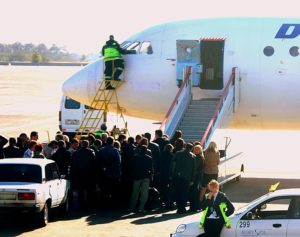
Set 23, 2018 | The Blog
 L’altissimo livello di conflittualità tra l’Amministrazione Trump e gran parte degli organi di stampa è un fenomeno che ha ormai più di due anni, se contiamo anche la campagna elettorale di Donald J. Trump.
L’altissimo livello di conflittualità tra l’Amministrazione Trump e gran parte degli organi di stampa è un fenomeno che ha ormai più di due anni, se contiamo anche la campagna elettorale di Donald J. Trump.
Chi vuole un quadro più completo dei continui scambi di accuse e dell’asprezza dei toni, farà bene a visitare dei siti di notizie americani per non doversi accontentare dell’agenzia di stampa nazionale ANSA, dove le notizie sono già filtrate e confezionate ad uso e consumo del PD, o quello che ne resta.
Di norma, l’ANSA si limita a tradurre (e spesso anche male) quanto appare sulla CNN o sul Washington Post, ambedue chiaramente schierati a sinistra.
Il mio consiglio è appunto documentarsi direttamente e trarre le proprie conclusioni invece di accontentarsi di quanto prodotto da intermediari maldestri.
In questo post voglio presentare una serie di termini giornalistici e politici che compaiono spesso sulla stampa americana. Dopo l’ormai arcinoto “fake news”, anche questi termini sono diventati di uso comune e potrà rivelarsi utile esserne al corrente.
Hit-job è un assassinio virtuale, un articolo pubblicato al fine di demolire un particolare individuo con argomentazioni e prove spesso inventate o esagerate. L’attuale tentativo di screditare il giudice Brett Kavanaugh, candidato da Trump alla Corte Suprema, è un classico esempio di political hit-job.
Op-ed (l’abbreviazione sta per “opposite the editorial page” oppure “opinion editorial”). Si tratta di un editoriale firmato da un opinionista esterno alla redazione della testata giornalistica su cui appare.
Puff-piece è quello che in Italia viene spesso chiamato una “marchetta”, un articolo scritto per osannare un individuo o un’azienda senza alcun ritegno e la pur minima obiettività. Quando l’ANSA parla del gruppo Fiat (pardon, del gruppo FCA) si tratta quasi sempre di puff-pieces.
Softball interview. Questa è la classica intervista all’acqua di rose dove l’obiettivo è far apparire l’intervistato in una luce positiva evitando accuratamente domande difficili e temi controversi. Ultimamente la CNN ha intervistato Hillary Clinton, offrendole un’ennesima opportunità per raccontarci a chi questa volta attribuisce la colpa del suo fallimento elettorale nel 2016. (P.S.: non è mai colpa sua).
Bombshell è una notizia esplosiva. La parola è spesso utilizzata senza ulteriori spiegazioni, oppure compare sotto forma di aggettivo precedendo termini come report, story, allegations, declaration e così via.
Leak è la cosiddetta “soffiata”, l’indiscrezione o fuga di notizie. Questo metodo sta diventando così diffuso che non esiste ormai organizzazione indenne da fughe di notizie, anche se in alcuni casi queste possono portare all’espulsione dei responsabili e/o a conseguenze penali. Paradossalmente la soffiata riceve più attenzione di un comunicato ufficiale e tende ad essere più creduta di questo.
Gotcha question. Gotcha sta per “got you”, ossia “ti ho beccato”. Si tratta di domande tranello per far cadere in trappola l’intervistato. Il giornalista ha già le prove per contestare la risposta dell’intervistato dimostrando che ha mentito E’ una tecnica del cosiddetto Gotcha journalism, in cui il reporter non si prefigge l’obiettivo di appurare la verità ma piuttosto di segnare punti per una causa politica. Esempio classico è la celebre intervista di Cathy Newman (dell’inglese Channel 4) al Prof. Jordan Peterson, uno psicologo canadese diventato molto famoso in tempi recenti (anche grazie alla stessa intervista con la Newman) per le sue tesi controcorrente. La Newman continuava a incalzare Peterson interrompendolo, rigirando le sue affermazioni e cercando di incastrarlo. La serenità e la compostezza del canadese nel demolire l’intervistatrice hanno fatto il giro del mondo. L’intervista ha registrato 12 milioni di “hit” su YouTube.

Lug 22, 2018 | The Blog
 I officially retired a couple of months ago, but it’s only now begun to dawn on me that I have effectively joined the category of retiree. There are two reasons for this delay. On the one hand, the social security administration failed to process my application on time, on the other, I haven’t stopped working at all—nor do I intend to, at least for a few more years.
I officially retired a couple of months ago, but it’s only now begun to dawn on me that I have effectively joined the category of retiree. There are two reasons for this delay. On the one hand, the social security administration failed to process my application on time, on the other, I haven’t stopped working at all—nor do I intend to, at least for a few more years.
The fact remains that this is another stage in my life and a largely uncharted one. For the first time in almost fifty years, I’m getting paid for doing nothing. (Of course, I know this is actually my money they’re paying me, but it feels funny nonetheless.)
Thinking about all this, I’ve concluded that we actually live a series of different lives within that period we commonly refer to as ‘my life’. Each one of these lives involves different objectives, a separate cast of characters, and—to a certain extent—different values.
Some core elements are continuously present in all these lives, starting with ourselves of course, but also including a number of loved ones and long-time friends, and some hobbies and passions we never dropped.
I can distinguish several such lives in my past, starting with my childhood and teenage years, followed by my first contact with that unique construct we call ‘work’—which amounts to surrendering a large part of your waking hours to someone else’s objectives in exchange for money.
In my case, I also count as distinct lives the years I spent in different countries, with different people, doing different jobs. In each one of these lives, I made myself at home in different contexts, mostly spoke different languages and spent my free time in different ways.
I also believe I always knew when each one of these lives was coming to an end and I was ready for the next one.
The last time this happened was ten years ago, when I transitioned from a senior management job to starting my own business. I felt ready for it, even though I could have picked a better moment, seeing as that point in time coincided with the beginning of a long and ugly recession.
I have to confess, however, that this new life I just stepped into has taken me by surprise.
Of course, I have known for years that I was going to officially retire at a certain age, but it’s still taking me some time to process the whole thing. That’s why I’m still hanging on to my chosen profession and, for the first time in my lives, I’m enjoying the unprecedented privilege of choosing my clients and the projects I want to work on.

Giu 2, 2018 | The Blog
Remember Bill Murray? Hint: he starred in Ghostbusters, Groundhog Day, etc.
A few days ago, in an interview with The Guardian, he expressed how he feels about those people who are obsessed with their social media presence.
Do you know anyone like that? I’ll bet you do.
“My only problem with it is that people now feel they should document their life rather than live it.”—said the 68-year-old actor.
It kind of reminds me of myself when I bought my first video camera all those years ago.
 On vacation, I’d be walking around like a SWAT trooper entering an unsecured building—except I was brandishing a VHS camera instead of an automatic rifle.
On vacation, I’d be walking around like a SWAT trooper entering an unsecured building—except I was brandishing a VHS camera instead of an automatic rifle.
The device would precede me into museums, restaurants, hotels, and onto scenic overlooks, boats, planes, and all sorts of vehicles.
When I came back from my trips, people would ask me, “Well, how did it go?”
“Uh—I would respond—I don’t know. I haven’t watched the video yet.”
I’m glad I got over that dumb phase. One of the reasons I did was the bulk of the camera and how inconvenient it was to carry it.
Fast-forward to present-day smartphones and the ubiquitous selfie-stick.
They’re easier to carry and they can even accompany you when you go skydiving, abseiling, climbing, skiing, etc.
Sadly, they’ll also get you run over by a bus or cause you to fall down a cliff when looking for the killer shot—the one that’ll go viral on the Web.
Killer shot, indeed.

Mag 18, 2018 | The Blog
“This position will require extensive international travel.”
Job ads containing this statement were the ones most applicants preferred.
Hey, I know this because this was exactly the kind of job I used to go for.
 For almost 30 years, my jobs would invariably involve ‘extensive international travel’ and I loved them for that.
For almost 30 years, my jobs would invariably involve ‘extensive international travel’ and I loved them for that.
There I was, barely in my thirties, jetting around the world in business class, staying at 5-star properties in Jakarta, Indonesia or Houston, Texas and occasionally generating some business in the process.
In those golden days of yore, I only had to worry about making connections and being picked up at the airport. I never even thought about airline crashes (I still don’t) and I never for a moment thought my pilot would deliberately fly his plane into the ground—or the big briny. You’re kidding, right?
I can recall just a handful of flights when we had some sort of technical problem (engine failure, autopilot down, go-around, etc.), the memories of which I still treasure. The captain would calmly announce the unexpected glitch and we passengers would hit the alcohol supply hard. (Some uncouth newbies would clap hands when we finally landed, while the business-class types—me included—would scoff at their lack of poise.)
I suspect a ‘Positions Wanted’ ad today will not emphasize the international-travel component at all. Here’s why:
- Companies have since introduced travel policies whereby only VPs and assorted royalty get to travel in business class.
- On top of that, news headlines have shown that you might end up with a demented pilot (either German or Malaysian) who’ll commit suicide by crashing his plane—whoa, your plane—into a ravine or the Indian Ocean.
In the first case, your international travel is now guaranteed to occur in a crowded coach cabin—planes are always 99.9 percent full; yield management systems have seen to that. Curiously, reservations systems will always surround you with noisy children and Neanderthals who use seatbacks as weapons of mass destruction.
In the second case, you now need to take a quick peek into the cockpit to see if the skipper appears deranged, suicidal or is wearing a kamikaze bandanna. Needless to say, this is pretty stressful and will quickly kill the residual lure of international travel.
The reduced amount of travel I do nowadays takes place in seats that would have been uncomfortable to me when I was 16. Airports are no longer glamorous and glittering but drab and overcrowded. Several Middle-Eastern bad actors have made sure security protocols have become more and more invasive and time-consuming over the years.
Folks, who needs this crap? I’m treasuring my memories of flying in aviation dinosaurs (Boeing 707s, Douglas DC8s and -10s—and even early-model Boeing 747s) for thousands of hours.
Millennials are most welcome to take the baton from me.

Apr 1, 2018 | The Blog
 After a rather long and wet winter, today—Easter Sunday, April 1—the sun is shining over Northern Italy and temperatures are just shy of 20° C.
After a rather long and wet winter, today—Easter Sunday, April 1—the sun is shining over Northern Italy and temperatures are just shy of 20° C.
As I watch our dogs chase Frisbees in a park near our home, I look up at the bright blue sky and realize there’s not a single cloud in sight, and the snow-capped Alps gleaming in the distance look closer than they really are. Incongruously, a German word pops up in my mind: Bombenwetter (literally bombs weather).
It’s an uncommon expression I picked up a few years ago while driving through Germany in a colleague’s company car. The weather was glorious and the German landscape was an explosion of green hues under a perfect blue sky. We had left Duisburg bright and early to visit customers to the south-east of our location and we were now heading into the sun on rustic back roads..
Guido (gi-doh), my German colleague, had been squinting into the sun for a few minutes when he finally reached into the glove box to retrieve his sunglasses. Bombenwetter, he told me by way of an explanation.
Still, I couldn’t make sense of what he had just said. “What do you mean, ‘bombs weather’?” I asked.
“Bombenwetter means a perfectly clear day”, he responded, but could not explain the origin of this quaint expression. He just said he’d learned it from his grandparents.
At that moment, as a buff of modern history, I thought I knew where the expression came from.
An Internet search later that day provided confirmation of my hunch.
During WWII, Allied bombers would often cancel their missions over Germany when the cloud cover was too thick. Conversely, a clear day would likely bring waves upon waves of Flying Fortress and Liberator bombers dropping ordnance on German targets.
Since Guido’s family came from the Düsseldorf area, there’s no doubt in my mind that his grandparents must have cursed sunny days an awful lot in the early Forties. Curiously, though, while their grandson did pick up the Bombenwetter expression, he was admittedly clueless about its origin. Many Germans of his generation I have met did not have a clear picture of the Second World War, nor of the ensuing Cold War—or perhaps they were in denial about those dark times in their country’s history.
I clearly recall another time when Guido and I were driving south on the A7 Autobahn. Headed for the Frankfurt area, we rode by the town of Fulda, which lies a few miles west of the former East German border.
The moment I saw the road sign pointing to the Fulda exit, I told Guido “We must be in the middle of the Fulda Gap”—that is, the flatland salient through which the Warsaw Pact armor was likely to launch an invasion of West Germany during the Cold War.
The blank look on my friend’s face told me he had no idea what I was talking about.
![]() L’altissimo livello di conflittualità tra l’Amministrazione Trump e gran parte degli organi di stampa è un fenomeno che ha ormai più di due anni, se contiamo anche la campagna elettorale di Donald J. Trump.
L’altissimo livello di conflittualità tra l’Amministrazione Trump e gran parte degli organi di stampa è un fenomeno che ha ormai più di due anni, se contiamo anche la campagna elettorale di Donald J. Trump.







